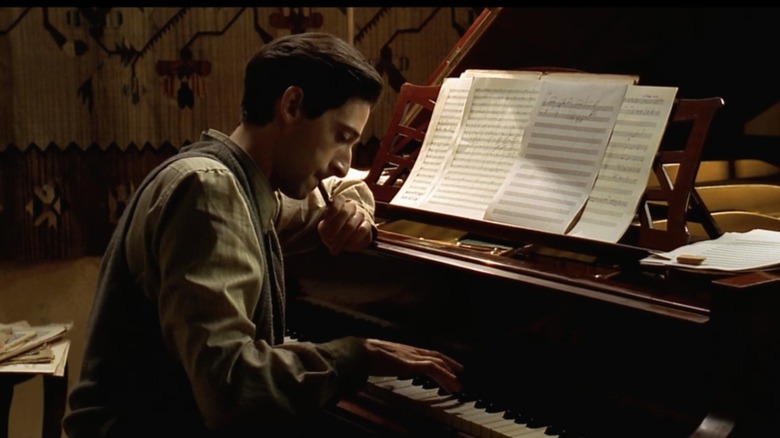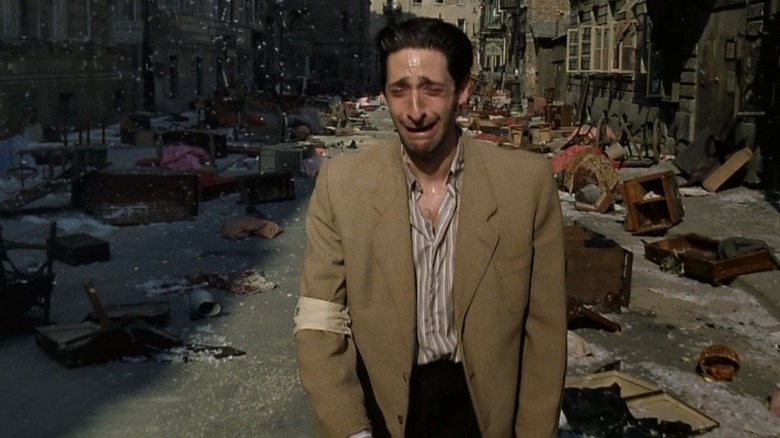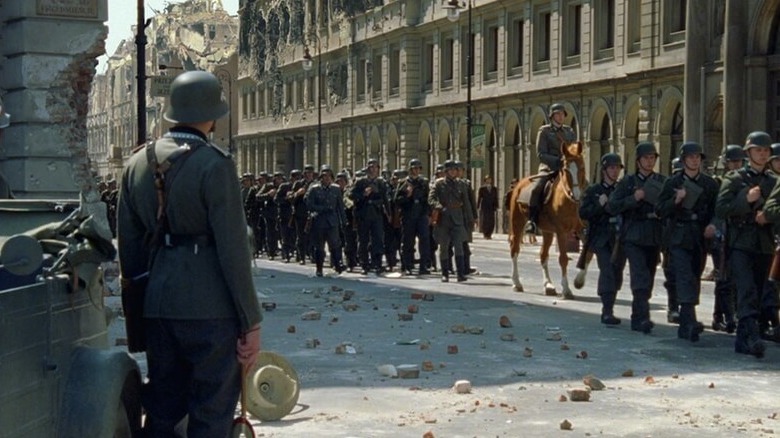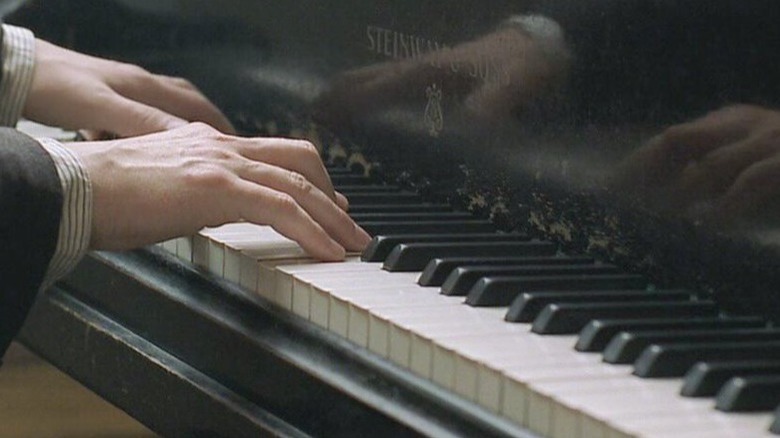The Pianist Ending Explained: Władysław Szpilman In The Warsaw Ghetto
Few movies about the Holocaust have matched the sheer, experiential horror of Roman Polanski's 2002 film "The Pianist," which balances its depiction of the pain suffered by Polish Jews with rare moments of human connection amidst collective terror, bolstered by nothing so much as the great music of Chopin. Polanski had dealt with controversy in his films before (beyond his own crimes, which would see him expelled from the Academy of Motion Picture Arts and Sciences in 2018), as with the "Satanic" cult film "Rosemary's Baby." But this movie would become something very different.
The horror of "The Pianist" is baked in reality, telling the true story of the Jewish Władysław Szpilman (Adrien Brody), who survived six years of Nazi Occupation in Poland. Brody didn't look much like Szpilman, but as Polanski said, "I didn't look for physical resemblance, because in my opinion it doesn't matter." What mattered was the performance, brought to life not just by Brody's learning of Polish and piano, but his incredible sense of observation and empathy.
"The Pianist" opens simply, as archival footage of pre-invasion Warsaw is scored gently with the sound of a piano, played by Szpilman. It turns out his performance is being broadcast on the radio. Explosions interrupt his playing.
Brody as Szpilman
We are suddenly thrust into the German invasion of Warsaw. Szpilman escapes to his familial home. The family is comfortable with each other, gathering around the radio to hear of France and England's declaration of war against Germany, and even joking about the new laws. The horror has begun, but it's not felt yet.
First, the Jews are forbidden from sitting on benches. Soon, they must wear Star of David armbands. Szpilman's family debates whether or not they'll wear them, but one quick cut reveals they've conceded. Viewers are forced to live with the absolute, unshakeable suddenness of these characters' world falling apart. They learn they will be forcibly moved to a ghetto, and their march begins.
Polanski crowds the scenes of the Warsaw Ghetto with people, suggesting the intensity of the congestion. When Szpilman's brother Henryk (Ed Stoppard) calls him out at dinner for playing in dining halls, the argument's interrupted again, as the family watches the Nazis throw a wheelchair-bound man from a sixth-story window. Like in the opening scene, the horror comes from how little can be done, and the ineffectiveness of the family as observers.
Playing Szpilman, Brody emphasizes that observational quality. As he told PopMatters, "there were extended periods of silence, where I was just called to react." Szpilman's no action hero. He's a musician, an artist, who does what he can to survive. It conveys the humanity and humiliations of Holocaust victims, and more than makes up for the butchering of Brody's performance in 1998's "The Thin Red Line."
Alone in Warsaw
More forced moves happen, as the family is ejected from their tenement in the ghetto to a camp. On the long walk to the train, Szpilman is separated from his family by an officer who claims he's "saving his life." He's made to watch again as his family is sent to the camp, brutally loaded onto the train cars. When he returns to the ghetto, he sees the corpses of a Jewish family on the sidewalk.
Forced into slave labor, Szpilman grows thinner, spending his nights roaming the blocks, helping to procure weapons for an impending revolt. His escape from the camp leads him to a friend in Warsaw, who leads him into hiding. "It's not going to be very comfortable," Szpilman's told as he spends one night behind a hardware shelf. He finds himself in another apartment, where he is instructed not to leave, and he continues to starve. "The Pianist" becomes a movie of endurance.
While Polanski didn't want a cameo appearance in the movie, thinking it would evoke the specter of Hitchcock, he does employ a classic Hitchcock editing technique. From his hiding spot, Szpilman is able to watch the failed Warsaw Ghetto Uprising, attempted with weapons he was able to bring in. Long before he cuts to a closer view of the action, Polanski emphasizes Szpilman's perspective — detached, impotent, bearing witness from above. And he cuts to shots of Brody watching, his face revealing a grave pain. He's still trapped.
A final escape
When a neighbor asks for Szpilman's identity card, he escapes the building and takes up hiding in "a very German area," continuing to stare out the window to snowy Warsaw. He grows sick, but more painful for him is that he must ignore the piano in his new hiding spot, the last connection to his old life. He imagines playing it.
Deathly ill, Szpilman must escape again, as the Warsaw Uprising of 1944 brings explosions and gunfire to his hiding spot. His hearing is practically blown out, and runs haphazardly through the ruins of his hometown. In a new hiding spot, he makes a connection that will change his life, as he meets German Officer Wilm Hosenfeld (Thomas Kretschmann). The two connect as Szpilman plays Chopin's "Ballade in G Minor." It's perhaps overly sentimental for a movie that embraced such horror in its first two hours to suggest in its final moments that a Nazi and a Jew would bond over music. But it was a true union, one that allowed Szpilman to survive past the end of World War II. Polanski claims that Szpilman "did everything he could to save Hosenfeld's life." In the movie's bittersweet conclusion, Hosenfeld ends up in a Soviet prisoner-of-war camp, dying in 1952, as Szpilman plays to a sold-out theater.
"The Pianist" is far from an easy watch, with its murdered families and long scenes of suffering and starvation, and Adrien Brody's Oscar-winning performance was a far cry from the typical biopic victory. The catharsis of Szpilman finally being permitted to play in full, even for a Nazi, is small but potent, resulting in one of cinema's most beautiful scenes of human connection.



